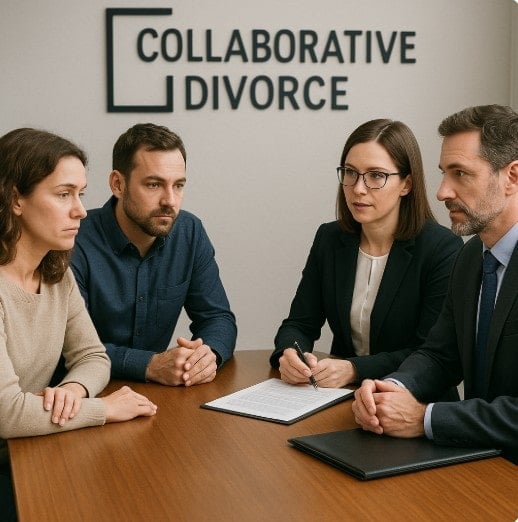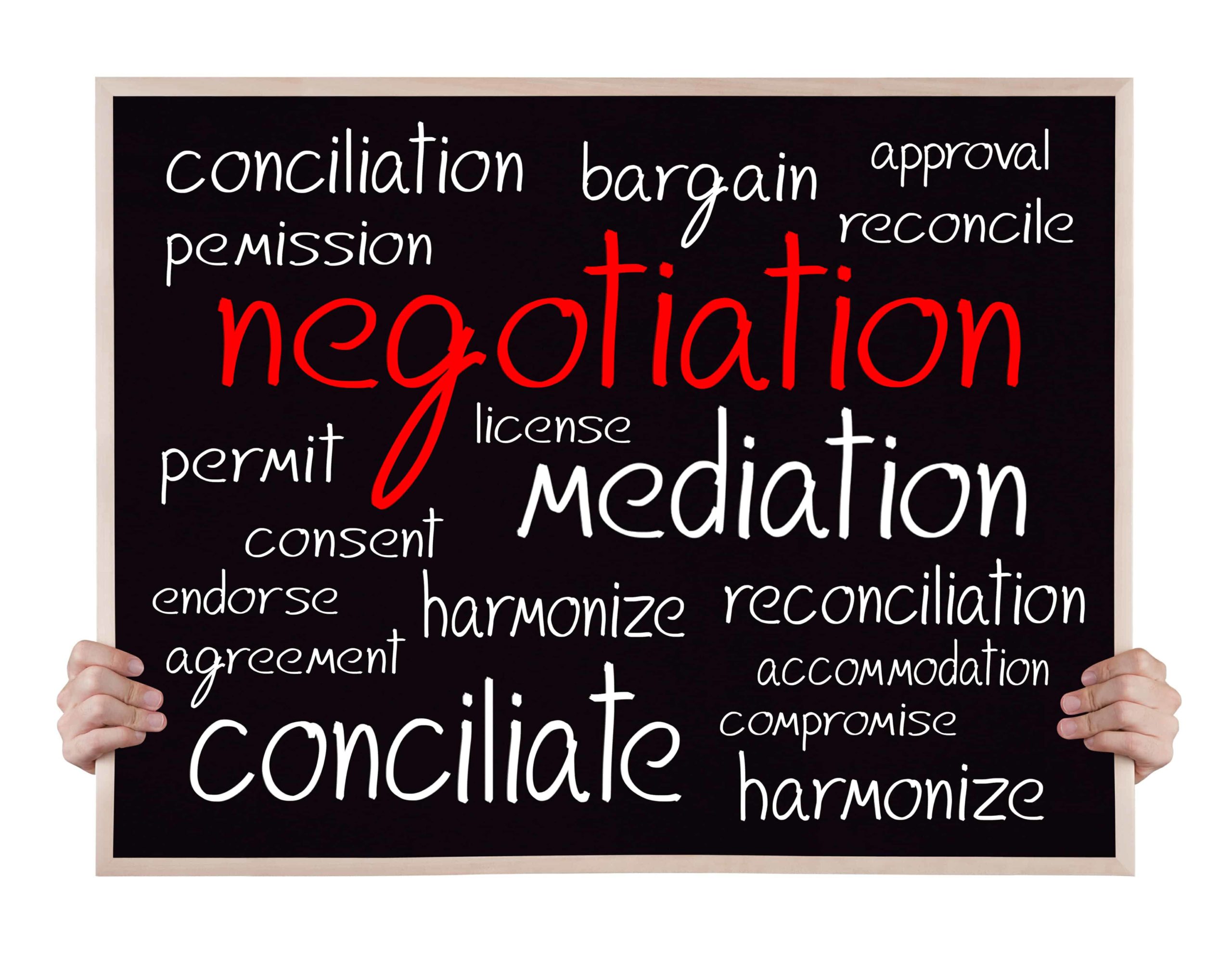To most ordinary humans, the term "divorce process" means "the way you get through a divorce." In other words, were you amicable or did you fight? Was your divorce journey miserable and ugly, or reasonably okay?
To a divorce professional, however, the term "divorce process" means "the process by which you get divorced." In other words, did you litigate? Did you mediate? Did you use Collaborative Divorce? What were the specific rules and protocols you used to get you through your divorce?
While this all may seem technical and boring - especially at first - choosing the right divorce process is one of THE most important choices you'll make in your divorce. That's because the divorce process you choose directly affects the outcome you get, and the way you experience your divorce all along the way.
Understanding Your Divorce Process Choices
In the past, the only divorce process that existed was litigation. If you wanted to get divorced you had to take your case to court. Period.
Today, there are at least five different divorce processes you can use to get divorced. There are also two ways to get divorced that aren’t truly “divorce processes” but are worth mentioning because everyone thinks they are divorce processes.
Here are some of the most well-known "divorce processes" that are currently being used today.

Divorce Litigation
Divorce litigation is the traditional way to get divorced. It’s a “court divorce.” You use the court process and procedures, and if you and your spouse can’t reach an agreement about what you want to do, a judge decides the issues for you.
How it Works
Divorce litigation starts when one of you files for divorce in court. Your spouse is then served with divorce papers. S/he then has to file an appearance in court (with or without a lawyer) and the court process begins.
Along with a petition for divorce you (or your spouse) may also file other motions in court, asking the judge to order your spouse to do certain things. For example, you might ask the judge to freeze assets, grant you temporary spousal support, temporary custody/decision-making, or temporary child support. You might ask the judge to set your parenting time schedule, decide where the kids go for holidays, or get involved in other parenting issues when you and your spouse disagree.
There are a multitude of different motions you can file in court. Filing any of them takes time, costs money, and usually catapults you into immediate battle with your soon-to-be-ex.
Discovery
Another part of litigation is the “discovery” process. Discovery is a formal process in which each divorcing person files written questions to be answered by their spouse (interrogatories), document production requests, and requests for their spouse to appear and answer oral questions on the record (depositions). In discovery you can also file subpoenas (requests for third parties to produce documents or appear for a deposition) and other kinds of requests for information.
Depending on how complicated your case is (and how quickly you and your spouse come clean with information), the discovery process can continue for months or years. It can cost a crazy amount of money. But if you have a spouse who is purposely hiding information, or just wants to make your life miserable, you can get stuck in this stage of the court process for a very long time.
Pre-Trial and Trial
Eventually, after you and your spouse have enough information to be able to address the issues in your case, the judge will hold a pretrial conference. At that conference, the judge will try to help you settle your case. If that doesn’t work, the case will go to trial.
At trial, the judge will hear testimony and receive evidence from both parties. At the end of a trial, the judge will decides all of the open issues in your case. If anyone is dissatisfied with the verdict, that person can appeal.
Mediation
Divorce mediation is a process in which an independent, neutral, third party (a mediator) meets with you and your spouse and tries to help the two of you work out an agreement in your case.
The Mediation Process

Mediation can be voluntary (i.e. you and your spouse agree to go because you want to stay out of court) OR a court can order you to go to mediation. However, while a judge can order you to mediate your divorce, s/he can’t order you to agree to settle your divorce in mediation. If you won’t voluntarily accept a settlement, the mediation is said to have “failed” or “reached impasse.” When that happens, your only option is to go (or go back to) court.
Like in litigation, mediation begins with information gathering. Unlike in litigation, however, in mediation you and your spouse are expected to voluntarily produce your relevant financial information to the mediator and to each other. There is no formal “discovery” process in mediation.
If either you or your spouse refuses to voluntarily produce information, the mediator can’t force you to do that. If either of you won't produce information (or if one of you is purposely hiding information), mediation won't work.
After the mediator has gathered all of the necessary information, s/he will then help you brainstorm creative settlement options so you can resolve your issues yourselves. The mediator will help you communicate with each other and make sure your “discussions” don’t end up becoming “arguments.”
If issues arise during the divorce that need to be resolved before the divorce is final (like temporary support etc.) you can mediate those issues instead of going to court with them
[NOTE: You and your spouse can agree in mediation to do things that a judge would never order you to do at trial. Mediation gives you much more flexibility and control in the way you handle your divorce.)
The Divorce Mediator
Your divorce mediator is supposed to be neutral. S/he doesn’t represent you or your spouse and can’t give you legal advice. Instead, the mediator acts as a facilitator to help you and your spouse talk to each other constructively and come up with a settlement that each of you will accept.
Once you settle all of your issues in mediation, your mediator will then write up the terms you agreed to into a written document. That document will then form the basis for your final divorce paperwork.
[NOTE: Even when you mediate your divorce, you STILL have to get a judge to sign off on your paperwork. You can either do that yourself (which is more complicated than it sounds) or you can hire a lawyer to do that part for you (which is way less expensive than hiring a lawyer to represent you through your entire divorce when you DON’T have a mediated settlement agreement.]
Collaborative Divorce
Collaborative Divorce is a process in which a divorcing couple, their lawyers, and other divorce professionals work together to resolve the couple’s divorce issues outside of court. Like mediation, Collaborative Divorce is a voluntary alternative to fighting in court. Unlike mediation, judges generally will NOT order anyone to use the Collaborative Divorce process.
Collaborative Divorce takes a “team” approach to divorce. Each spouse MUST hire a lawyer who has been trained in the Collaborative Divorce Process. Then the couple and their lawyers hire one or two divorce coaches, a child specialist (if necessary), and a neutral divorce financial planner to help them negotiate their case.

The hallmark of Collaborative Divorce is the professional withdrawal provision. If a couple fails to settle their issues in the Collaborative Process and instead goes to court, then all of the divorce professionals, including the attorneys, the financial advisor and the coaches, must withdraw from the case. That means that if the couple ends up in litigation, they must start all over again with different divorce professionals.
As in every other divorce process, the divorcing couple also goes through an information-gathering phase in their divorce. The financial advisor helps the couple input their information into a usable budget and balance sheet. From there, the couple, with the help of the divorce professionals, negotiates their issues.
The lawyers then draft up the necessary divorce documents. The couple and their lawyers then go to court and the judge finalizes their divorce.
Divorce Arbitration
Divorce arbitration is an informal hearing process that is very similar to trial. The main differences are that arbitrations are handled outside of court by an arbitrator, instead of inside of court with a judge. Like every divorce process other than litigation, divorce arbitration is voluntary.
Arbitration is very different from mediation. In mediation, the mediator helps the couple resolve their own issues. If the couple can’t resolve their issues, the mediation fails, and the couple goes back to court. The mediator has no authority to order the couple to do, or not do, anything.
In arbitration, the couple gives their arbitrator the power to make their divorce decisions for them. The arbitrator is therefore very much like a private judge. If the couple goes all the way through arbitration, they are no longer settling their own divorce. The arbitrator decides their divorce issues for them, in essence telling them what they will do.
Arbitrations are much like trials, and they’re governed by very specific rules. The divorcing spouses choose their own arbitrator and have to agree on the rules of the arbitration before they proceed. For that reason, arbitration is not used in divorce very often. In some places it’s not available at all. However, in very high net worth cases, using an arbitrator or private judge is fairly common.
If a couple can’t agree on who their arbitrator should be, or they can’t agree on the rules that will govern the arbitration, or they don’t want to pay the arbitrator, then they won’t be able to arbitrate their divorce.
After the arbitrator enters his/her arbitration award, the couple still has to go to court and present the arbitrator’s award to the judge. The judge usually approves the award and then grants the couple a divorce. However, if, for any reason, the judge DOESN’T approve of the award, the couple has to fix whatever provisions of the award the judge decides are not reasonable or appropriate.
Direct Negotiation/Co-Operative Divorce

Direct negotiation, or co-operative divorce, has many names and can take many forms. Unlike Collaborative Divorce, which follows a very specific, established process, “co-operative divorce” has no single set process. For that reason, some professionals don’t acknowledge co-operative divorce as a real divorce process. Yet, people use it all the time.
The simplest form of "co-operative divorce" is known as a “Kitchen Table Divorce.” It happens when spouses sit down at the kitchen table and settle their issues themselves. They then either get a lawyer to draft their agreements into formal court documents or they get their documents done online.
Sometimes, people want to divorce amicably, but they can’t talk to their spouse without ending up in an argument. In that case, they may hire lawyers to negotiate for them, without the couple being personally involved in the process.
Lawyers can negotiate in a variety of ways. They can sit down and talk with each other, or they can draft and exchange written settlement proposals. They can also hold a “settlement conference” where the lawyers and the parties sit down in a conference room and try to negotiate a settlement themselves. (This is much like mediation without a mediator.)
In a “co-operative divorce” lawyers may or may not begin the court process at the same time they’re gathering financial information and attempting to negotiate a settlement. There may be practical or strategic reasons for starting the litigation while you’re also trying to settle your case.
No matter how a couple finally reaches a negotiated settlement, in the end, lawyers have to write up their formal court documents. (Or, they have to get the documents done online.) The couple then has to have a judge sign off on those documents.
Online Divorce
Lots of people think that they can go online and get a divorce. They can’t. The only person who can divorce you is a judge. In most states that means that someone (you, your spouse, and/or the lawyers) has to either go to court or present your documents to a judge for his/her review and signature.
What “online divorce” usually refers to is online document production. Instead of paying a lawyer to draw up your court documents, you go online, pay the online document production service, answer some questions, and then your documents are produced for you.

Having a computer program produce your divorce documents is almost always cheaper than having a lawyer draft them. But you get what you pay for.
Lawyer-drafted documents are usually much more accurate and complete than online documents. (At least, they are at this point in time.) Lawyer-drafted documents are also tailored to properly address the issues in your divorce, and to meet your court's requirements.
If your documents are not done properly (a significant percentage of online documents fall into this category) the judge can refuse to sign them. Then you will not be divorced and you’ll have to start over, drafting your documents again.
No matter who drafts your documents, though, someone still has to file those documents in court and have a judge approve of them in order to finalize your divorce.
DIY Divorce
DIY (Do It Yourself) divorce, like online divorce, is not a specific divorce process. It simply means that you are going through your divorce without a lawyer.
You can do a DIY divorce using most of the divorce processes mentioned above. You can mediate, litigate, and negotiate your divorce without a lawyer. (That’s not to say that doing your divorce yourself is a good idea! But you can do it.)
Even if you go the DIY route, however, you would be wise to at least consult with a lawyer on the side for guidance. Lawyers today can provide you with their advice, and even draft your documents, without “taking your case” for full on representation. That’s known as getting unbundled legal services and it’s now available in most places.
Again, using unbundled legal services isn’t a great idea in every case. But in cases where you don’t have a lot to fight about, it provides you with SOME legal guidance at a significantly lower price point than full-on representation. Please note, it’s ALWAYS better to talk to a lawyer and know your legal rights and responsibilities BEFORE you settle your divorce. Otherwise, you risk making mistakes you may not be able to fix later.
Obviously, doing your divorce yourself will be cheaper than using a lawyer. But, unless you have a very simple case (i.e. no money, no children, no property and a short marriage), doing your own divorce can cause you a boatload of problems later.
Also, to do your own divorce, you have to be willing and able to learn enough about the law and the courts to be able to navigate the system on your own. So, you may save money, but the trade-off is you will spend way more time on your divorce than someone who has a lawyer. (… and you may have to go to court numerous times before you finally get it right.)

Choosing the Right Divorce Process
The best divorce process for you is generally going to be the one that can get you through your divorce with the least amount of time, energy, expense, and destruction. That having been said, figuring out which divorce process will do that for you isn’t always easy.
The Pros and Cons of Litigation
Litigation is the default divorce process. If you and your spouse can’t agree on which divorce process to use, you WILL litigate your divorce. Every other process is voluntary.
Litigation is usually going to be the best choice in domestic violence cases. Most high conflict divorce cases are going to end up in litigation, whether that’s best for them or not. But, for everyone else, using any of the other divorce processes is often going to be better.
The Pros and Cons of Mediation
Divorce mediation is a cheaper, faster, and more private way to divorce than going through litigation. It’s usually the best way to resolve a divorce when the parties want to be amicable, but just can’t negotiate their issues themselves. Unfortunately, it doesn’t work for everyone.
Because mediation is a voluntary process, not everyone will agree to go to mediation. If a court orders you to go to mediation the mediation process still won’t work unless both people participate in mediation in good faith.
If someone is purposely hiding information, or refuses to negotiate in good faith, mediation won’t work.
The Pros and Cons of Collaborative Divorce
Collaborative Divorce is the most supported way to go through a divorce. It is particularly effective in cases where a couple has complicated finances, or difficult issues to resolve regarding their children. It works best when couples still respect each other and want to resolve their issues amicably.
Collaborative Divorce, like the other court-alternatives, is a more private way to divorce. It also provides couples with much more flexibility and control in their divorce.
Collaborative Divorce is cheaper than full-on litigation. However, it is not the cheapest way to get a divorce. It usually won’t be the best choice for couples who are on a budget.

The Pros and Cons of Co-Operative Divorce or Direct Negotiation
Negotiating directly with your spouse is always going to be the cheapest way to get divorced. It’s also the easiest way to make mistakes or get taken advantage of. If there is a power imbalance in your relationship, negotiating directly with your spouse won't work. The same thing is true if you or your spouse doesn’t understand finances.
Getting lawyers to help you negotiate your divorce amicably can work amazingly well. But you have to have the right lawyers! You need lawyers who will work with you to negotiate a settlement, rather than fight in court. Hiring the wrong lawyers can turn your “co-operative divorce” into all-out war.
If you're going to use “Co-operative divorce” you've also got to realize that it is a very unstructured process. Different lawyers will interpret what it means to be "cooperative" very differently. Because of that, co-operative divorce can easily turn into a war, even when that's not what you intended. It can end up taking just as long and costing just as much as a traditional divorce. On the other hand, if you and your lawyers can really focus on negotiating rather than on fighting, cooperative divorce can work well.
The Pros and Cons of Arbitration
The biggest downside of arbitration is that it is not available in most places. Very few divorce lawyers are trained as arbitrators. Because divorce arbitration isn’t widely sed, most divorce lawyers are skeptical of it and won’t use it.
The second challenge with arbitration is that before you can use it, you and your spouse have to agree on an arbitrator AND agree on the rules you will use in your arbitration. If you can’t agree on all of that, you can’t arbitrate your divorce.
The biggest upside of arbitration is that it can be used to settle either your entire case, or just a piece of your case. So, if you have one big issue in your divorce that, if you could just settle that, everything else would fall into place, arbitration could be a great option for you.
Divorce arbitration is also cheaper, more flexible and more private than going to court.

Which Divorce Process Will Be Best for You?
Knowing what your choices are is one thing. Making the best choice for you, is something entirely different. Here are some questions to ask yourself to figure out which divorce process you should use:
1. Was there physical or emotional abuse in your marriage?
If so, trying to mediate, or get divorced without a lawyer can be dangerous.
2. Do you have a long term marriage or a complicated financial situation?
If so, you definitely need a lawyer, but might benefit a lot from collaborative divorce, or mediation with an experienced mediator.
3. Do you have special needs children? Or, are you worried that your kids won't adapt well to your divorce?
If so, Collaborative Divorce can provide you with access to a specially-trained child specialist who can help you get through your divorce in the way that twill do the least damage to your kids.
4. Are you and your spouse both willing to voluntarily provide accurate and complete financial information?
If not, litigation may be your only option – unless you don’t mind getting cheated.
5. Are you completely lost when it comes to your finances?
If so, Collaborative Divorce can help you a lot. In Collaborative Divorce you will have the benefit of having a divorce financial planner to guide you through your financial issues. This extra expertise can help a lot if finances aren't your thing.
__________
This article was originally published on April 18, 2018, and updated on December 5, 2025.


Thank you for all the information you provided…very helpful
I live in NC and was separated 3/6/2017….married 28 years….2 children (23 and 18)….worked entire marriage
My attorney filed the divorce on 3/10/2018
My husband filed a counterclaim and we are going through equitable distribution at this time.
My attorney filed the motion for divorce on 4/17/2018 and told me the judge will sign around 5/4/2018
I’m asking you for clarification to the following questions
What exactly is counterclaim? My attorney said it gives my husband the right to go before a judge if we can’t resolve equitable distribution ….she said it wasn’t a big deal and it was a good thing.
And
Do we have to resolve equitable distribution before the divorce signing or are they considered separately? What is the best way?
The questions you are asking are legal questions, and I can’t give you legal advice online. What I can tell you, in a general educational sort of way, is that a “counterclaim” is a claim that counters the one you filed. So, you filed a claim (or petition) for divorce from your husband. Your husband has now filed a claim (or petition) for divorce from you. What that means is that, even if you were to drop your claim for divorce, your husband would still be able to push the divorce through. So, one way or another, you’re getting divorced! (Unless, of course, both of you decide to drop your claims against each other.)
If your attorney says its no big deal, you should probably trust your attorney (or get a second opinion from another NC attorney.)
As for whether your property division can be resolved separately from your divorce, that’s a question for your lawyer, too. (Sorry!) I could give you the answer in Illinois, but that won’t help you in NC.
Karen
I was in prison several of the 18 years I have been married to what I’ve come to learn is a drug addicted prostitute who gave birth to 5 children I am quite certain are not mine but were given my last name and Child support enforcement continues to fine me. My estranged wife lives in Virginia somewhere and I have started a new life with a woman who I wish to marry in Washington state. She purposely avoids my attempts to locate her so I can request a divorce and dna testing on all the kids. Can you help me with advise.
Wow! That’s a tough one. The best thing you can do is find and hire a really good divorce lawyer in Virginia. You could also try to find a private investigator or process server in Virginia. They can then try to find your wife. But, since you’re going to need a lawyer to file all the documents and pursue this for you anyway, it might make more sense to find a lawyer who can handle this situation and let him/her handle it. The attorney should have a private investigator that s/he uses to find people.
Of course, if you can find your wife on your own, so much the better. But that will mean that either you hire a private investigator yourself, or you go down there and look for her on your own (which I don’t recommend!).
Also, if your wife is getting child support checks, presumably they are being sent somewhere. So there has to be a way to find her.
Good luck!
Karen